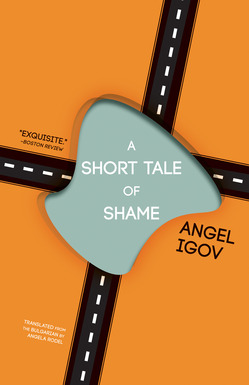
…the story is not only about fleeing one’s shame and insecurities but also about articulating one’s identity in the face of a larger, confusing society that never ceases to change. The stand-out moments of A Short Tale of Shame lie not in the resolution of the friend-love triangle, but in the characters’ semi-mythical experience of the journey. —Tom Faure
A Short Tale of Shame
Angel Igov, translated by Angela Rodel
Open Letter Books, May 2013
145 pages, $13.95
Angel Igov’s A Short Tale of Shame, translated from the Bulgarian by Angela Rodel, is a fine novel that explores how we attempt to escape grief and humiliation, often literally by fleeing through travel.
In some respects Igov has crafted a classic road story. After the death of his wife, middle-aged former musician Boril Krustev has thrown a few belongings into his shiny red car and taken off, vaguely heading south. Tellingly, he does not bring with him a guitar—has not played in months. The story opens after he picks up hitchhikers Maya, Sirma, and Spartacus. They soon recognize him as the father of their childhood friend Elena. Surprisingly, they invite him to join them for the rest of their journey. Krustev tentatively agrees, without fully knowing why—he questions at times whether to leave the younger, liberal youths to their own adventures. Elena is at the heart of each character’s shame, and her libidinous involvement with the hitchhikers is revealed gradually and with artfully-controlled pace. Her awkward inclusion into and subsequent expulsion from the students’ friend-love triangle, all referenced obliquely through their reminiscences, ultimately produces much of the tension of the novel.
Born in Sofia in 1981, Igov studied at Sofia University and was a Fulbright visiting researcher at the University of California, Berkeley. He is currently working toward a PhD in European Literature and has been nominated for awards not only for his fiction but also for his criticism and translation. He has published two short story collections and won the Southern Spring award for debuts in fiction. A Short Tale of Shame was the co-winner of the Contemporary Bulgarian Writers Contest.
Igov’s novel is ambitious and experimental on two fronts: in its setting and in its style.
Some foreign readers will not immediately realize we are in “a country that geographically and culturally resembles Bulgaria, yet its history and ethnography seem to have gone some alternative way.”[1] This semi-fictitious “Thracian-dominated state” resembles what is known today as the historical region of Thrace—South East Bulgaria, North East Greece, and North West Turkey—a swath of land that has been invaded by everyone from the Huns to the Celts to the Romans. The setting informs an intriguing secondary theme: questions or crises of identity permeate the novel.
Today, Bulgaria’s population of 7.5 million includes ethnic Turks, Pomaks, Jews, Roma, Russians, Armenians and more. As the English-language Bulgarian magazine Vagabond puts it, “Its long history of local wars, migrations and – in later times – constant changes of national borders has complicated the picture further, turning what is now called Bulgaria into a place where a significant number of diverse minority groups live. Distinguishing between them is sometimes a strenuous task. Some of them are ethnic, others – religious. . . . The origins of most are obscure and often disputed.”[2]
Recently become a member of the European Union (in 2007), Krustev realizes he can drive around the continent at his ease. He has boldly decided to cut through the slightly sketchy Rhodope Mountains to reach the Aegean Sea. We learn more about the history of the region, fraught with ethnic and territorial feuding. Krustev is of the Slavic minority but he muses that this “was no worse than being an Illyrian or Paeonian, and it was definitely much better than being a Dacian.” The history of Balkan upheaval mirrors his anxiety about his ethnicity and his music career. The hitchhikers, who have taken a semester off from college, also experience confusion about who they are and what their futures have in store.
Igov enhances the semi-mythological setting by invoking the story of Croesus and waxing lyrical about the tragic idea of hubris—which also reinforces the compelling themes of mixed traditions and confused identity.
The road formula has offered a long list of heroes, from Gilgamesh to Hunter Thompson, various forms of escape and salvation, but A Short Tale of Shame does not suffer too greatly from treading across worn paths. It is indeed a short tale but one rich with psychological intensity, a story unraveling through reminiscence and rumination. Along with the intriguing setting, Igov’s spare yet expansive writing is what really stands out:
So Sirma was of Lydian descent. Maya couldn’t have been more surprised . . . The absurd fact that Sirma hadn’t talked about it during all the years they had known one another, not only known one another, but had become a common organism, the three of them with Spartacus. It’s like your right leg blurting out to your left hand something it had never suspected, hmm, maybe that isn’t the best comparison, but given that it was something that wasn’t important in the least, why hadn’t she mentioned it until now? . . . To keep quiet about something that didn’t matter, that wasn’t OK, because it puts you in a privileged position and Maya was taken aback by the whole pointlessness of the miscarried secret.
Those consumer readers who are growing more and more used to computer-optimized, bite-size text blocks may have difficulty with Igov’s style of unremitting paragraphs—frequently lasting five or six pages—that flit from past to present and from character to character.
It’s not that Igov is obscurantist—far from it. Rather, he approaches clarity the same way our minds do: by wandering, emotionally sometimes, open to possibility and non-linearity, much like a road tripper might be. The careless reader misses out on what I find to be the main reward of longer, lyrical paragraphs: an energy that builds and amplifies the further the writer goes, building a tension within very sentences and even clauses that in some cases better mimics the madness of the itinerant mind:
As they came out of the water together, Sirma was still shaking from fury and relief, even though, she told herself, the three of them were not supposed to be here at all, and if everything had gone according to plan they wouldn’t be here, then this whole scene would never have happened, but in that case every moment and every action gave rise to and at the same time ruled out countless possibilities, tiny grains of sand, indistinguishable from one another they all dried off with the same towel which Krustev had prudently brought along, how had the thought that he would go and drown himself ever crossed her mind, given that the man had brought a towel, and they sat down on the ground.
The book’s ten chapters interchange close third-person narrators (for the most part switching between them as seamlessly as Virginia Woolf does in Mrs. Dalloway), and perhaps it is the nature of the automobile that helps preserve the pace and flow: all four characters, borne out in an aimless jaunt in this car, are equal protagonists escaping from various troubles, each given equal value in the rhetorical structure of the novel.
Even so, Igov’s curious form of free indirect discourse can be jarring—especially when it delivers exposition that risks feeling too condensed:
But perhaps every time was strange—wasn’t it strange that he was now riding with Elena’s father, the Beautiful Elena, she was surely the only person who had seriously threatened the unity of their trinity. Maya had brought her to them. She had introduced her ecstatically as her best friend from grade school. Damn, said Sirma. Elena was pretty, artistic, and a half-Slav. Her father had once been the guitarist in Euphoria, and now he was really rich.
Though omitting explicit references to On The Road or other obvious classic road stories, Igov’s novel does allude by name to The Catcher in the Rye[3]. This is apt; in their transformative journey the characters resemble Holden Caufield rather than Sal Paradise, and the traveling at hand is not for kicks so much as to escape phonies and figure out who they are.
“. . . The established eighth graders were just eighth graders, while the new eighth graders, who really should have been preparatory. . . . Sirma had told her one day some time at the end of the fall. You know what the older kids call us? Fakes. Why fakes, Maya didn’t get it. . . . I’m not trying to fake anybody out, Maya said, and I don’t get it at all, it’s not like we decided what they’d call our classes. . . . Maya didn’t know any of the upperclassmen and had nothing to say to any of them, but she was indignant nonetheless. Why the hell fakes?”
Again, the story is not only about fleeing one’s shame and insecurities but also about articulating one’s identity in the face of a larger, confusing society that never ceases to change. The stand-out moments of A Short Tale of Shame lie not in the resolution of the friend-love triangle, but in the characters’ semi-mythical experience of the journey. The novel ends by leaving the reader with a simple image—one that, unlike the complex ethnic history of the region, is more permanent: the characters gathered on the beach, Krustev deciding to pick up a guitar, the group discussing when to head back home.
—Tom Faure
————————————
Tom Faure is an MFA in Fiction student at Vermont College of Fine Arts. His work has appeared in Zocalo Public Square, Splash of Red, and a few undergraduate magazines at Columbia University. He lives in New York, teaching English and Philosophy at the French-American School of New York.
- From Bulgarian Elizabeth Kostova Foundation for Creative Writing, a co-publisher of the original edition of A Short Tale of Shame.↵
- http://www.vagabond.bg/high-beam/2022-diverse-bulgaria/2022-diverse-bulgaria.html↵
- Granted, one could argue Salinger’s novel is also a “road story.”↵

